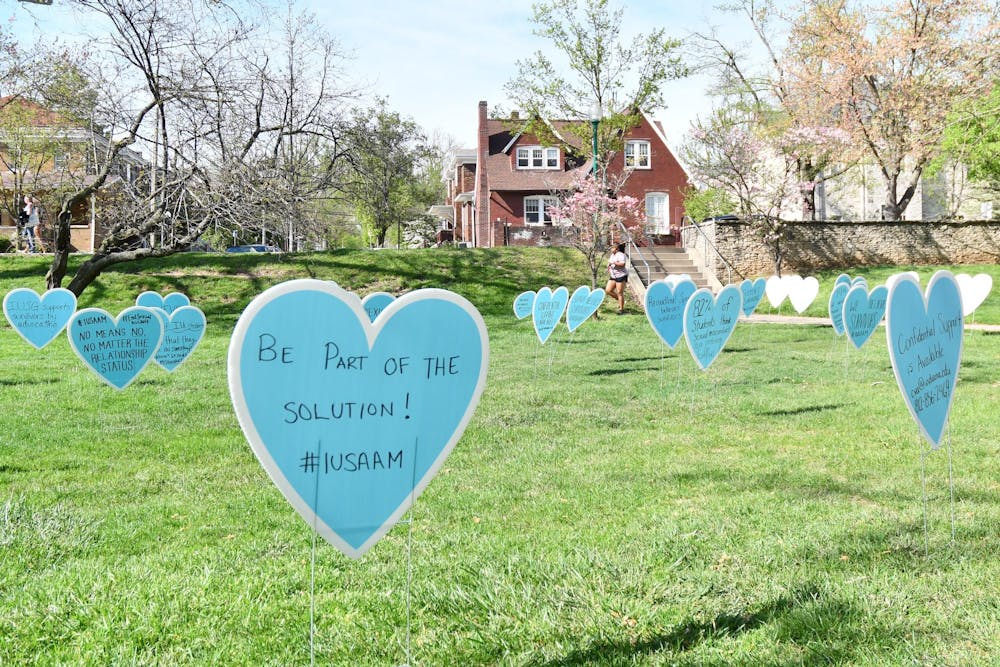Editor’s Note: This story includes mention of sexual assault. Resources are available here.
The Office for Sexual Violence Prevention and Victim Advocacy has been holding events around campus for Sexual Assault Awareness Month this April. Sexual Assault Awareness Month was first observed nationally in 2001, according to the National Sexual Violence Resource Center’s website, but advocates have been organizing events, marches and observances related to sexual violence before that.
Sexual Assault Awareness Month is helping to bring awareness of sexual assault on campus and the scope of the issue, Molly Weiler, assistant director of sexual violence prevention at the office for sexual violence prevention and victim advocacy said. The month is focused on identifying tools that can be used to prevent violence and safety factors that help university wide structures build in violence prevention.
The office is hosting several events throughout April to raise awareness and support survivors of sexual violence. On April 10, the office held “Let’s Talk About Healing” in the Neal-Marshall Black Culture Center Courtyard.
Weiler said the event educated students on health equity, which includes fair access to education and income, employment and social support. Weiler said health equity is a big factor in preventing violence and healing after experiencing violence.
On April 13, the office hosted a Paint the Campus Teal event in Dunn Meadow with other student organizations. The event worked to spread supportive messages and information about sexual assault around campus.
During the event, students could write supportive messages and information about campus resources in chalk.
On Wednesday, the office hosted Cookies and Consent in the Global and International Studies Building. During the event, Weiler said the office gave out cookies and flyers about what consent looks and sounds like, along with a QR code for IU’s consent policy.
Denim Day, which is April 24, is a campaign to discuss how clothing is not consent. Students are asked to wear denim to support survivors and stand up against sexual assault.
Weiler said the office will also be handing out information about what to do and not do, to support survivors.
“We try to pick a couple big projects and topics to do each year,” Weiler said. “And the way that we make those decisions are based on student feedback that we've gotten from previous years.”
RelatedFirst Nations’ annual Traditional Powwow canceled in wake of solar eclipse The Traditional Powwow is normally held in the beginning of April.
Throughout the year, Weiler’s office does sexual violence prevention, which includes sexual health education and prevention methods. The office also does presentations and tables on topics like rape culture and intersectionality and has five full-time confidential advocates. These advocates, she said, don’t release information without the survivor's permission, unlike employees, who are legally required to report information about sexual misconduct.
“They help with safety measures for survivors, which can include protective orders or changing housing, doing things like that, as well as academic support,” Weiler said.
This support can include getting grade change requests, helping facilitate conversations with professors if a survivor needs to miss class, helping the survivor decide on if they want to report and then helping them through the process of reporting if they choose to do so.
Weiler also works with respondents, the person who was alleged to have caused harm, after taking an alternative resolution. According to university policy, alternative resolutions can occur in appropriate cases, such as accepting responsibility, mediation, developing action plans, voluntary resolutions and appropriate sanctions or remedies. Weiler said she meets with them as part of an agreement and also does one-on-one training sessions with respondents.
Even though April is the month where the office can do more programming specifically about sexual assault, this is an issue that affects people daily, Lucy Downs, a licensed mental health counselor working in Counseling and Psychological Services’ Sexual Assault Crisis Services department, said.
“We're here year-round to support folks, and this is just an opportunity to heighten other people's awareness of how this impacts folks and provide more resources,” Downs said.
Being intentional about campus resources, she said, helps connect survivors and those who care about them to resources more easily.
The sexual assault crisis services, Downs said, provides individual and group counseling for survivors of relationship violence. The office supports people who experience an acute incident of sexual violence on campus and provides services to anyone who identifies as a survivor.
“So, folks who have experienced childhood sexual abuse, sexual assault prior to coming to the campus, sexual violence outside of campus, inner-partner violence, domestic violence, stalking, harassment, things of that nature,” Downs said, “It's really self-identified survivors, and they're able to access free ongoing counseling at CAPS through the SACS department.”
The department doesn’t have session limits, Downs said, because there isn’t really a timeline in this area of work. Sexual Assault Awareness Month and SACS, she said, are important because a lot of people are uncomfortable talking about sexual violence. But survivors, she said, don’t have the privilege of not thinking about it.
“That's the most important piece, is to take some of the burden off those individual survivors and make sure the broader campus community knows how to support them.” Downs said.
A list of resources is available here if you or someone you know has experienced sexual harassment or abuse.
RelatedBehind your eclipse viewing experience: How the universe made it possible You are only alive because of pure coincidence — countless numbers of them.




